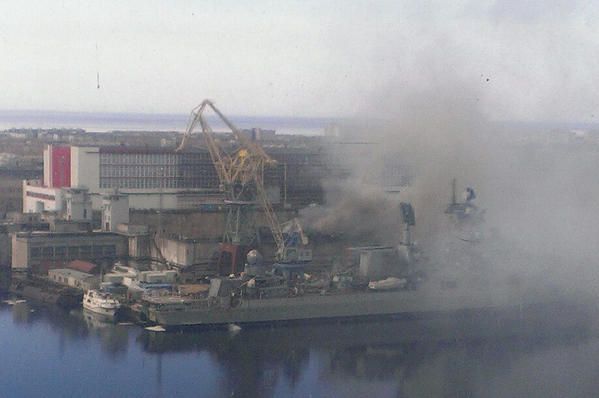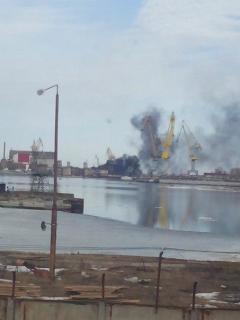
Arctic Frontiers: Disinformation, Security and the Northern Sea Route
Bellona held a seminar on countering Russian disinformation in the Arctic at the Arctic Frontiers international conference in Norway
News

Publish date: April 7, 2015
Written by: Charles Digges
News
MURMANSK – The Orel, a Russian nuclear submarine undergoing repairs at the Zvezdochka shipyard in the Arkhangelsk Region caught fire earlier today – the latest in a series that have taken place at shipyards owned by Russia’s United Shipbuilding Company.
As of 18:00 CEDT Wednesday it was still not clear if the blaze was under control, the BBC reported. The Orel has been in dry-dock for over a year, according to various Russian-language reports.
Today’s fire represents the fourth at a shipyard operated by Russia’s Unified Shipbuilding Corporation since 2011.
The blaze aboard the 155-meter-long submarine at the Severodvinsk shipyard began when welding works went awry, agencies reported. The Oscar-II class vessel does not have weapons or nuclear fuel on board, an anonymous source told the Itar-Tass official news agency.
Witnesses near the site report heavy smoke. Several fire brigades have responded to the fire, according the Russian news agencies. The agencies, citing anonymous sources, say the Orel’s rubber insulation hull is on fire.

The fire engulfed some 20 square meters of the insulation hull. No radioactive released have been reported.
“According to preliminary information, rubber insulation between lightweight and the rugged design of the submarine is burning,” the official state newswire Itar-Tass quoted a law enforcement official as saying.
The sub joined the Northern Fleet in 1992, reports say, and while on patrol at sea is armed with anti-ship missiles. The source told Tass that the submarine’s nuclear reactor was shut down long before Tuesday’s blaze.
“The active zone of the reactor was unloaded at the start of repairs a few years ago,” the source said.
There have been no reports of casualties.
“We are pleased to hear that there is no submarine spent nuclear fuel and ammunition on board,” said Bellona Executive Director Nils Bøhmer. “But I would like to see some independent confirmation of this information from Russian sources.”
Later reports from Tass suggest the submarine may have been immersed in water to put out the fire.
“The foam attack being carried out to extinguish the fire is not bringing results,” a source told the news agency.
“Complete flooding of the dock with water is being considered,” said the source, according to Tass.
In 2011, the Yekaterinburg nuclear submarine was damaged in a huge fire during repairs in northern Murmansk’s Roslyakovo shipyard under seemingly identical circumstances.
Nine people were hurt fighting the blaze that started after the Yekaterinburg’s rubber-coated outer hull caught fire. Roslyakovo is owned by the United Shipbuilding Company.
Two more fires over the last few years at Shipyards owned by the United Shipbuilding Company
In September 2014, another fire broke out aboard the Tomsk nuclear submarine in the Pacific Fleet at the Zvezda shipyard near Vladivostok. The Tomsk fire bore many similarities to the Yekaterinburg fire: A gas powered saw used to cut through a grate set the vessel’s worn rubber covering, cables and paint on fire.
In March 2014, the Krasnodar, another nuclear submarine undergoing repairs at the United Shipbuilding Company’s Nerpa shipyard also caught fire during repairs. Reports surrounding that incident also blamed faulty welding works.
“It’s of great convert that the United Shipbuilding Company is not learning from its past mistakes,” said Bøhmer. “We can expect more fires in the further – there should be stronger governmental oversight to stem this and change their practices.”

Bellona held a seminar on countering Russian disinformation in the Arctic at the Arctic Frontiers international conference in Norway

Our December Nuclear Digest, reported by Bellona’s Environmental Transparency Center, is out now. Here’s a quick taste of three nuclear issues arisin...

Bellona has launched the Oslofjord Kelp Park, a pilot kelp cultivation facility outside Slemmestad, about 30 kilometers southwest of Oslo, aimed at r...

Our November Nuclear Digest by Bellona’s Environmental Transparency Center is out now. Here’s a quick taste of just three nuclear issues arising in U...